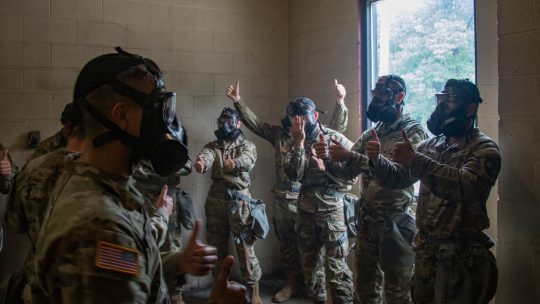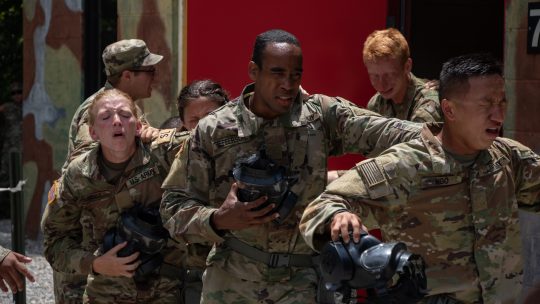On an unpredictable battlefield, only nine seconds, and a good set of gear, can be the difference between mild irritation and suffocation.

This was taught to Cadets of 7th Regiment, Advanced Camp through an uncomfortably hands-on method on July 7, 2021, during their Chemical, Biological, Radiological, and Nuclear training, or CBRN, at Fort Knox, KY.
After being given extensive lessons on their JSLIST (Joint Service Lightweight Integrated Suit Technology) suits, a set of protective clothing to wear over their uniforms, as well as the M50 Protective Masks, Cadets formed lines and charged into a small, unventilated concrete building in the woods.
Inside the dark room there were artistic murals, a speaker for music, and air filled with burning chemicals. The Cadets felt the irritation on their skin, but their M50 Masks allowed them to breathe normally.
“It builds confidence in the Cadets. A big part of being a leader is having confidence,” said 2nd Lt. Shaun Cox. “It’s really important because when you get issued equipment, you want to know that it actually works.”
This was not the end of the demonstration, however. To show Cadets just how much the masks were helping, group by group, they took them off and waited before leaving.
Although it is non-harmful, tear gas is anything but comfortable, and within a moment of removing their masks the Cadets were gasping, crying, and wishing they could put them back on.
To force themselves to breathe, the Cadets were told to sing along to songs like “Party in the USA,” or “Old Town Road,” but few words could escape their mouths in such a state.
Many Cadets were extremely nervous beforehand, but Master Sgt. Michael Anderson of the University of Arkansas, who had been exposed to tear gas around fifty times, shared his advice: “Breathe shallow and know that it’s not going to be comfortable. Just understand that it’s going to be over quick, and you can get through it.”

While the others were nearly suffocating, Anderson was seemingly unaffected, and engaging in conversation with other Cadre, although he insisted that the pain was still there.
“One way or another, you’re going through it so you might as well go through with happy thoughts and smiling than dreading it,” said 2nd Lt. Cox.
After recovering from the effects, Cadets were in high spirits, and definitely were more confident in their equipment and their own abilities as future leaders.




